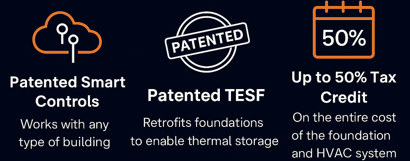Fargo ND 58102




IRS Tax Credit Eligibility Engineering Brief: ThermoVault™ TESF Systems
After the signing of the OBBB
1. Statutory Framework & Legal Basis
ThermoVault™ Thermal Energy Storage Foundation (TESF) systems are eligible for the federal Investment Tax Credit (ITC) under the Internal Revenue Code, as detailed below:
A. Primary Credit: IRC § 48 — Energy Credit for Geothermal Systems
-
26 U.S. Code § 48(a)(3)(A)(vii): Defines energy property to include equipment using "ground or ground water as a thermal energy source".
-
26 U.S. Code § 48(a)(3)(B)(ii): Requires that such property be "constructed, reconstructed, or erected by the taxpayer".
-
26 U.S. Code § 48(a)(10): Requires compliance with prevailing wage and apprenticeship standards for full 30% credit.
-
30% ITC applicable if:
-
Construction begins before 12/31/2034
-
In-service date before 12/31/2036
-
B. OBBBA § 112015(c)(2) — Thermal Storage Inclusion
-
Amends § 48 to explicitly include thermal energy storage if:
-
It is functionally interdependent with geothermal heat exchange equipment
-
It is built contemporaneously with the geothermal system
-
It is used exclusively for thermal energy transfer
-
C. Bonus Credits Under § 48(e):
-
+10% Domestic Content
-
+10% Energy Community
-
+10% to +20% for Low-Income Communities
D. Alternative Path: IRC § 48E — Clean Electricity Investment Credit (post-2024)
-
Begins Jan 1, 2025
-
Applies to energy storage technologies meeting clean energy criteria
-
No expiration unless U.S. emissions fall below 25% of 2022 baseline
-
Requires:
-
Domestic production compliance (IRC § 7701(a)(52))
-
Demonstrable clean energy or energy storage functionality
-
E. Transfer and Elective Pay
-
IRC § 6418: Transfer of credits to unrelated taxpayers
-
IRC § 6417: Elective direct pay option for tax-exempt entities
2. Technical System Justification for Eligibility
ThermoVault™ systems satisfy the technical and legal requirements of § 48 and OBBBA § 112015(c)(2) based on the following characteristics:
i. Functional Interdependence with Geothermal Loop
-
TESF integrates dual fluid loops (HETF and CETF) embedded within structural slab poured atop geothermal trench zones.
-
The HETF (Heating Energy Transfer Fluid) loop circulates heated fluid from ground-source heat pump, distributing energy into TESF storage layers.
-
The CETF (Cooling Energy Transfer Fluid) operates reciprocally to absorb and discharge cooling loads.
ii. Contemporaneous Construction
-
TESF thermal storage infrastructure is poured in a continuous monolithic slab during initial construction of the geothermal system, meeting the contemporaneity test.
iii. Sole Purpose: Thermal Energy Transfer
-
The TESF stores, discharges, and regulates thermal energy exclusively for heating and cooling purposes. No electrical generation or unrelated load is served.
iv. AI-Driven Control Integration
-
VaultCore™ controller and ZoneBoard™ modules deliver predictive automation, TOU optimization, and thermal zone regulation.
-
Real-time fluid modulation and demand response logic meet energy storage control criteria under § 48E.
v. Empirical Validation
-
Pioneer House and Tiny House testbeds provide empirical validation of dynamic slab charging/discharging, confirming thermal storage behavior consistent with energy storage system standards.
3. Conclusion and Recommendation
ThermoVault™ systems meet the requirements for:
-
30% ITC under § 48, including bonus credits where applicable
-
Thermal storage inclusion under OBBBA § 112015(c)(2)
-
Optional post-2024 pathway under § 48E
Developers are advised to retain engineering documentation, construction timelines, and functional integration schematics for audit defense. Tax-exempt builders may elect direct pay under § 6417.

Important Information for Consumers

Did you know you could save money on your utility bills and receive a tax credit
for certain clean energy installations?
The amount of the credit is 30% of the
qualified expenses (including certain labor
and installation) paid by the taxpayer. Do
not include interest paid including loan
origination fees. The credit amount is limited
to 26% for 2033 and 22% for 2034
Note: The credit amount is uncapped,
except for fuel cell property, which is limited
to $500 for each half kilowatt of capacity, or
a maximum of$1,667 for each half kilowatt
of capacity when more than one person
lives in a home.
The Residential Clean Energy credit can
apply to certain clean energy installations,
including:
• Solar panels
• Battery storage technology (not less
than 3 kwh)
• Solar water heaters (see standards
below)
• Geothermal heat pumps (Energy Star)
• Small wind energy projects
• Fuel cell property
In general, roofing materials and costs are
not covered. Solar roofing tiles/shingles that
function as both roofing and solar electric
collectors are covered.
Clean energy installations must be owned
(not rented or leased) by the taxpayer who
claims the tax credit. The eligible property
may be installed at any residence the
taxpayer lives in.
The residence need not be the taxpayer’s
primary home except for fuel cell
expenditures. Landlords who are not
residents of the dwelling unit may not claim
this credit.
The Residential Clean Energy Credit can be
applied to new construction.
If the residence is used in part for business
purposes, the maximum available credit is
reduced if the business use of the home is
20% or more.
To claim the credit, taxpayers must file IRS Form 5695

Individual taxpayers can claim the credit regardless of income, but the credit is
nonrefundable, so the credit amount you receive can’t exceed the amount you owe in tax.
You can carry forward any leftover (unused) credit and apply it to reduce the tax you owe in
future years.
To qualify, clean energy installations must meet the following standards
• Battery storage must have a minimum capacity of at least 3 kWh.
• Solar water heaters must be certified by the Solar Rating and Certification Corporation or
a comparable entity endorsed by the government of the state where it is installed.
• Geothermal heat pumps must meet the requirements of ENERGY STAR.
Find out more about Home Energy Tax Credits and the Inflation Reduction Act at
IRS.gov/HomeEnergy.
Publication 5968 (5-2024) Catalog Number 94949S Department of the Treasury Internal Revenue Service www.irs.gov